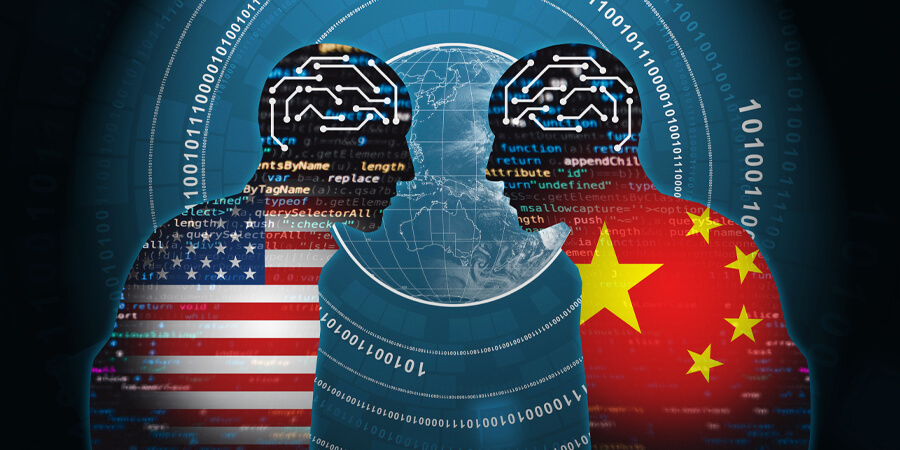Artificial intelligence (AI) has rapidly grown in China. Its market value already stands at 20 billion euros and has the potential to double in the next two years. Beijing has the ambitious goal of overtaking the United States and becoming the world leader in AI by 2030. AI — the technology simulating human intelligence and commanding the biggest headlines — has far-reaching applications in generating text, images, videos and creative designs, with seemingly endless new use-cases discovered every day. China's swift progress in this field is causing certain of the nation’s professions to start fearing their demise, with experts warning of AI's potential to disrupt our relationship with reality at its very core.
The AI Marathon: China vs. the US
AI's rising prominence recently made it onto the G7 summit's packed agenda. This surge in concern coincides with US efforts to limit China's access to crucial technology. Currently, the US appears to be leading the AI race, and restrictions on semiconductor exports to China may hinder Beijing's technological advancement. Nonetheless, analysts believe that China has the potential to catch up since perfecting AI solutions takes years. Chinese internet companies are notably advanced in specific areas, but their ability to manufacture high-end equipment lags behind global leaders. But for how long?
Silicon Valley’s Impact
One of the distinct US advantages is that of Silicon Valley, a global hub of entrepreneurship and innovation that has given birth to tech giants like Google and Apple. This unique research culture allows innovators to work on technology improvements without immediate profit motives. Such a fruitful creative environment has been largely absent in Chinese companies, though, as they are often able to build advanced AI systems only after witnessing their popularity elsewhere. Additionally, US investors have played a crucial role in supporting such research, as exemplified by Microsoft's $1 billion investment in OpenAI.
China's Competitive Advantage
China's staggering population of roughly 1.4 billion people further strengthens its commanding position on the global stage. This vast demographic reservoir not only presents an immense market for AI applications but also serves as a wellspring of invaluable user data. The country's thriving internet sector is emblematic of this phenomenon, with platforms like WeChat becoming integral to the daily lives of its citizens. WeChat's omnipresence goes beyond mere messaging; it's a multifunctional powerhouse, enabling everything from communication and financial transactions to booking appointments and tax filings. This widespread usage generates an unprecedented amount of user-generated content and interactions, providing a goldmine for AI development.
Crucially, China's comparatively relaxed approach to privacy regulations sets it apart on the global stage. While this might raise concerns in terms of data security and individual privacy, it undeniably translates into more extensive datasets available for AI training. This data-rich environment empowers AI algorithms to better understand and respond to user behavior, tailoring experiences with remarkable precision. In contrast to regions with stringent privacy safeguards, China's data landscape allows AI to explore new frontiers and reach unparalleled levels of accuracy and personalization in quick order.
Challenges Ahead
China's authoritarianism raises questions about censorship and its impact on AI chatbots. However, most users in China are aware of censorship and tend to avoid putting in controversial questions. The bigger concern lies in US efforts to restrict China's access to advanced technology, particularly semiconductors, which are crucial for such advanced AI hardware. To overcome this, China must foster a research culture akin to Silicon Valley, attracting diverse talent and encouraging long-term innovation.
The Future of State-Sponsored AI Research in China
Chinese tech companies have historically prioritized short-term profits and have instead looked to the state to spearhead greater technological leaps. The Chinese government has decided to develop AI technologies through state-sponsored labs rather than incentivizing private companies. These regional AI research labs, backed by metropolitan governments, have attracted world-class experts and indicate China's commitment to AI research.
The division of labor between the state and the private sector remains intact, with the state fostering technological leaps and the private sector focusing on commercialization. However, two key questions remain: Will China consolidate these labs into a national AI research system, and will state-sponsored AI labs become state-owned enterprises as AI technology matures?
Impact on the Global Order
State-sponsored AI research in China has the potential to significantly impact the global and societal structure. China's robust internal market and comprehensive supply chain make it well-prepared for a potential shift towards deglobalization. In contrast, the US, which has largely outsourced manufacturing, may be less prepared for such a scenario. State-sponsored AI research is akin to China's Apollo Program, positioning the country for a new world order if deglobalization becomes a reality.
In conclusion, China's quest to lead the AI race is a multifaceted endeavor marked by challenges and opportunities alike. As the competition intensifies, especially with the USA, the outcome will not only shape the future of AI but also influence the global balance of power in the technological landscape and beyond.








